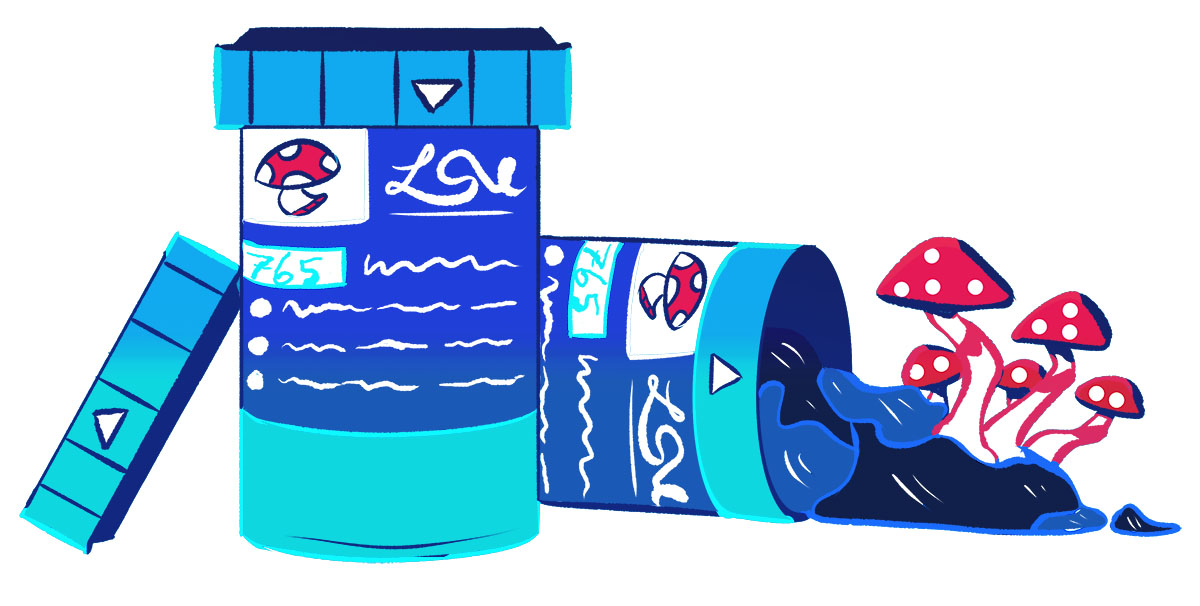Shrooms: an illegal drug that’s been used for thousands of years and still remains prevalent today. Magic mushrooms, otherwise known as shrooms, are mushrooms that naturally contain hallucinogenic substances like psilocybin and psilocin, allowing users to embark on psychedelic trips when they’re ingested. These psychoactive substances being classified as a Schedule III drug in Canada — meaning that they’re illegal unless authorized for clinical trial or research purposes — remains controversial. Are these fungi a harmless way to experience something new, or a dangerous substance worthy of their outlaw?
The history of these humble mushrooms dates back thousands of years when they were used for medicinal and ceremonial purposes in Indigenous cultures all over the world before being outlawed by government bodies. Psilocybin was first identified and synthesized by chemist Albert Hofmann, and once the ‘60s hit, the hippie subculture latched onto psychedelics and the use of magic mushrooms skyrocketed. Research into psilocybin was also growing during the ‘60s, but this became extremely limited after it was banned in 1970 in the U.S.under the Controlled Substances Act.
Medicinally, researchers have recently been challenging the illegality of magic mushrooms. An overview study published in 2017 found that the use of psilocybin shows promise in treating conditions like depression, anxiety, OCD, and alcohol dependence. However, the problem with most studies is that the number of participants are low and the dosing and protocol are tightly controlled due to the schedule of the drug, limiting the conclusions they can draw. These studies don’t take into consideration the use of psilocybin outside of a clinic setting or that rates of nonadherence (not taking the drug as directed) can be higher in mental health populations. In order to sway the public perception of shrooms or change the current scheduling of the drug, future research should aim for larger sample sizes and protocols that are more realistic.
Just because psilocybin is currently an illegal drug doesn’t negate the health benefits it shows in studies; research findings deserve to be taken seriously and further explored. However, the science doesn’t support that it’s ready for medicinal use yet. There are still gaps in our knowledge of how psilocybin works to relieve psychiatric conditions, and it’s important for the data to be solid and understood before there’s widespread use. History, in cases like thalidomide and DDT, has taught us that using the general public as guinea pigs for drugs that aren’t properly researched isn’t worth it.
Overall though, the benefits of mushrooms seem to outweigh the risks. Griffiths and colleagues, who conducted a study on the psychological effects of psilocybin in healthy individuals, found that a majority of their patients rated taking psilocybin as one of the most meaningful experiences of their lives. Another study done at Johns Hopkins University found that a year after treatment with psilocybin, participants showed increased openness to new ideas, experiences, and perspectives. This is no surprise, as fans of the psychoactive fungi often report transformative and spiritual experiences with the drug. Furthermore, there are no reports that psilocybin mushrooms are addictive, psychologically or physically, or that use leads to dependency.
This brings us to the use of psilocybin mushrooms for leisure, where the biggest question seems to be: why not? For healthy individuals who start at low doses, there seems to be little risk of having a bad trip. A 2017 Global Drug Survey by an independent research company found that 5.2 per cent of psilocybin users have reported ever having a difficult or negative experience and that psychedelic drug users were generally sensible and prepared compared to other drug users. That last part is paramount: doing research into how to use safely can make or break an experience with shrooms. If readers take away one thing, it should be that with shrooms, do it right or don’t do it at all.
However, the main danger of shrooms is largely due to the illegality of the drug: the possibility of contamination with other substances and a lack of education on how to use psychedelics safely to limit reckless use. Additionally, individuals predisposed to or who currently have a psychiatric condition could be at a higher risk for negative side effects, although this requires further research. These individuals would benefit more from waiting until psilocybin has been developed into a legal medicinal substance so they could have their use monitored by health-care professionals and experience less stigma about receiving medical attention if they have a bad trip.
Magic mushrooms have proven themselves to be more than your garden-variety fungus. They offer users hallucinatory experiences that many find meaningful, and they show potential to be used medicinally in the future. Although they’re currently illegal, research on psychedelic drugs is going through a renaissance that’s focusing on mental health rather than stigma, suggesting that shrooms should be the next drug decriminalized in Canada.
Illustration: Kayt Hine/The Cascade
Chandy is a biology major/chemistry minor who's been a staff writer, Arts editor, and Managing Editor at The Cascade. She began writing in elementary school when she produced Tamagotchi fanfiction to show her peers at school -- she now lives in fear that this may have been her creative peak.


